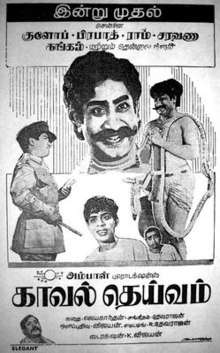Kaaval Dheivam
| Kaaval Dheivam | |
|---|---|
 Film poster | |
| Directed by | K. Vijayan |
| Produced by | S. V. Subbaiah |
| Story by | Jayakanthan |
| Starring |
Lakshmi Sivakumar S. V. Subbaiah |
| Music by | G. Devarajan |
| Cinematography | Vijayan |
Production company |
Ambal Productions |
| Distributed by | Ambal Productions |
Release date |
|
Running time | 145 minutes[2] |
| Country | India |
| Language | Tamil |
Kaaval Dheivam (lit. Guardian deity) is a 1969 Indian Tamil film, directed by K. Vijayan. The film stars Sivaji Ganesan, Sowcar Janaki, Lakshmi and Nagesh in lead roles. The film had musical score by G. Devarajan.[3] The film was a moderate success at box-office. The film was an adaptation of the novel Kai Vilangu written by Jayakanthan.[2] The film was remade in Kannada as Devara Mane (1985).[4]
Plot
Aanaikundram Jail. Superintendent K. Raghavan is a man of integrity and humaneness who views the 500 inmates as 500 books that need to be perused. He stays with his wife Alamu in the bungalow adjoining the penitentiary, and the childless couple treats the prisoners with compassion and love, for they look upon the inmates as the children they never had. Chamundi who is serving a life sentence for killing one of the 2 villains who had fatally molested his teenaged daughter Sivakami, Syed who, Kesavan who ensures that he is arrested ever so often on trivial crimes, for he prefers the comforts of the prison to the uncaring outside world.... With the unusual backdrop of a prison, JK endows each character with an interesting history and subtle idiosyncrasies.
In the nearby Allikkulam village lives Manickam- an honest, hardworking youth who is the leaseholder of Raghavan’s lands. Manickam and Kokila love each other. The scoundrel Marimuthu, an unwelcome suitor of Kokila, sees his dreams of marrying Kokila coming to nought, and schemes with his accomplices to harm Manickam. They spy Manickam and Kokila singing and romancing, and this increases their ire. Marimuthu accosts Manickam near the Aiyanaar statue. When Marimuthu speaks deprecatingly of Manickam’s lineage, Manickam sees red. He plucks the sword from the hands of the Aiyanaar statue and injures Marimuthu. Manickam is arrested and sentenced to 5 years imprisonment. Superintendent Raghavan consoles him and treats him with kindness.
The story then captures the interesting events in the prison. Of particular interest are the sequences that involve Chamundi. Chamundi sees the other man who was responsible for his daughter’s death as an inmate in the prison and manages to hack him to death one night. For this crime, Chamundi is sentenced to death, and the death sentence is carried out. In the meantime, Manickam gets the news that his mother is seriously unwell. He grieves for her and longs to pay her a visit. On his own accord Superintendent Raghavan takes the unprecedented step of permitting Manickam to go to Allikkulam to see his mother, after eliciting a promise from him that he would return to the prison by daybreak. The next day is Raghavan’s last day in service, and Raman Nair arrives to take charge as the new superintendent. Manickam has not yet returned, and Raman Nair refuses to take charge until the headcount tallies with the roster. Raghavan is confident that Manickam will return, and his confidence is not misplaced. Manickam arrives just in the nick of time. Raghavan retires; his honour and reputation untarnished.
Cast
- Lakshmi
- Sivakumar as Manickam
- S. A. Ashokan
- S. V. Subbaiah as Raghavan
- O. A. K. Devar
- V. Gopalakrishnan
- Sivaji Ganesan as Chamundi (guest appearance)[5]
- T. S. Balaiah in Guest Appearance
- V. K. Ramasamy in Guest Appearance
- M. N. Nambiar in Guest Appearance
- R. Muthuraman in Guest Appearance
Production
Actor S. V. Subbaiah decided to venture into production and also expressed his interest in adapting Kai Vilangu, a novel of Jayakanthan because of his admiration towards the writer. K. Vijayan, who earlier acted in Paathai Theriyudhu Paar and also a good friend of Jayakanthan made his directorial debut with this film. Jayakanthan willingly gave the rights to film the novel and also agreed with the choice of Vijayan as the director.[6]
Jayakanthan suggested the title of the film as Kaaval Deivam. Most of the cast like Balaiah, Nambiar and Muthuraman agreed to do cameo appearances as an ode to their friendship with Subbaiah.[6]
Reception
Ananda Vikatan, in a review dated 8 June 1969, praised the firm for its story and the cast performances.[7]
References
- ↑ Saravanan, M. (2013) [2005]. AVM 60 Cinema (in Tamil). Rajarajan Pathippagam. p. 223.
- 1 2 Rajadhyaksha, Ashish; Willemen, Paul (1998) [1994]. Encyclopaedia of Indian Cinema (PDF). Oxford University Press. pp. 399–400. ISBN 019-563579-5.
- ↑ "Kaaval Dheivam". nadigarthilagam.com. Retrieved 27 August 2014.
- ↑ https://kannadamoviesinfo.wordpress.com/2013/02/27/devara-mane-1985/comment-page-1/
- ↑ "From Nambiar to Saranya Ponvannan: The character actors of Tamil cinema". The News Minute. 10 October 2017. Retrieved 18 April 2018.
- 1 2 https://web.archive.org/web/20090305112859/http://www.dhool.com:80/sotd2/990.html
- ↑ "காவல் தெய்வம்". Ananda Vikatan (in Tamil). 8 June 1969.